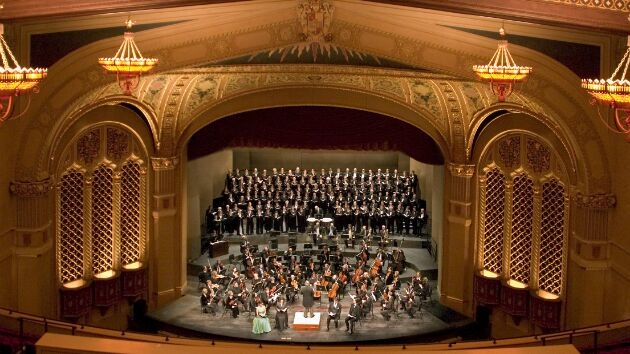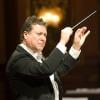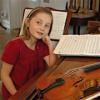
Symphony Silicon Valley’s concert on Saturday at the California Theatre in San José, led by frequent guest conductor Carlos Vieu, featured quiet, calming, pastoral music, just the thing to heal the soul after the tragic events of that morning.
The compositions came from two composers, near age-mates from the generation that flourished around the turn of the 20th century. There were early works by Claude Debussy and later ones by Richard Strauss. The repertoire took form after Vieu offered to bring along with him from Argentina a star of the opera stage there, soprano Daniela Tabernig, who here made her U.S. debut in one piece by each composer.
Debussy’s La Damoiselle élue sets a French translation of Rossetti’s The Blessed Damozel. It was written in the late 1880s, at the height of Debussy’s enthusiasm for Wagner, and evokes that composer’s opera Parsifal, but it doesn’t sound Wagnerian. The lightly written orchestral score is typical of Debussy’s work, though the harmonies are more conventional than the ripe and exotic sound he would make his own in later years.
Tabernig sang the principal role with restrained characterization, in a strangely hollow and distant voice that sounded as if it originated offstage instead of from in front of the podium. Her voice was, however, admirably resonant and carrying. Local mezzo Layna Chianakas was pure and clear in the supplementary narrator role. There are also a few bits for women’s chorus, craftily enriched by being written in four-part harmony. The Symphony Silicon Valley Chorale Women, directed by Elena Sharkova, carried this off outstandingly, the 41 voices projecting clearly from the back of the stage.

For a bit of supplementary Debussy, Vieu led the orchestra in the Petite Suite, Henri Büsser’s orchestration of Debussy’s piano original. Dating from about the same time as La Damoiselle élue, the suite sounds even more purely French. Vieu led the music with as much speed and energy as was compatible with its light gentility. Quieter passages gave clear and distinct instrumental sound, while the fortes sounded compact and boxed-in.
Tabernig reappeared for Strauss’s Four Last Songs. Backed with a larger and more enthusiastic accompaniment, her voice was more character-filled and less hollow, but also less carrying, than in the Debussy. Though the songs are resigned and autumnal, even the one titled “Frühling” (Spring), the Strauss orchestra has a vigor that Vieu did not try to suppress.
The outstanding achievement here was in the song “Beim Schlafengehen” (When Falling Asleep). Buildup in successive string sections at the start of the song, followed by a rising figure in concertmaster Robin Mayforth’s solo violin, passed on to Tabernig, were gripping and moving. The deep Romanticism of Meredith Brown’s horn at the end of “September” was equally effective.

Strauss’s final contribution to the program came from Der Rosenkavalier. This Viennese-inspired opera predates the Four Last Songs by some 38 years, but is often considered the first work of Strauss’s late period. What was played here is called an orchestral suite (it was arranged by an uncredited hand, possibly Leonard Bernstein’s, and published in 1945), but is more a continuous symphonic portrait of constantly shifting character.
The resemblance to a Strauss symphonic poem gave Vieu all the opportunity he needed to belie generalizations about the concert’s pastoral nature and to be as thrilling as possible, constantly pulling the music forward into the next phase. Huge overpowering crescendos and climaxes, separated by lakes of peaceful calm, came off like Ein Heldenleben or the Alpine Symphony. A rendition of the opera’s big waltz tune, “Ohne mich,” had each phrase exaggeratedly separated and played with differing character. The sudden joyful coda came out like an amalgamation of Till Eulenspiegel with Also Sprach Zarathustra. Vieu had never led a Strauss tone poem in San José, but effectively he has now. He should do it again, officially.




